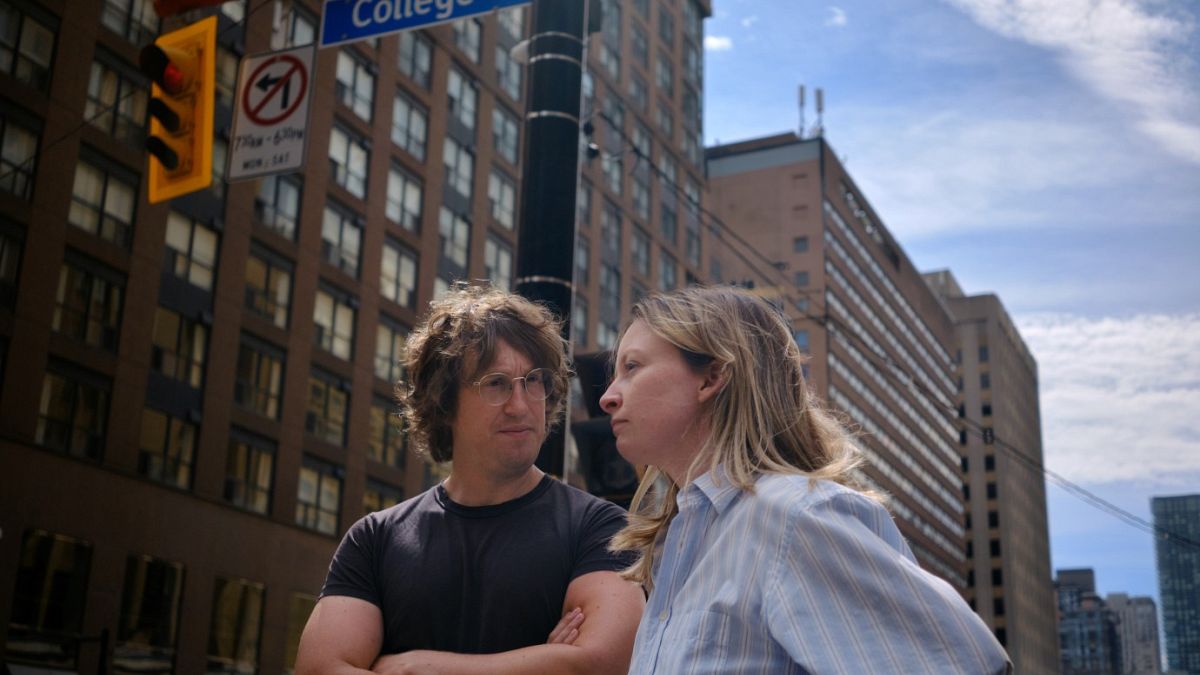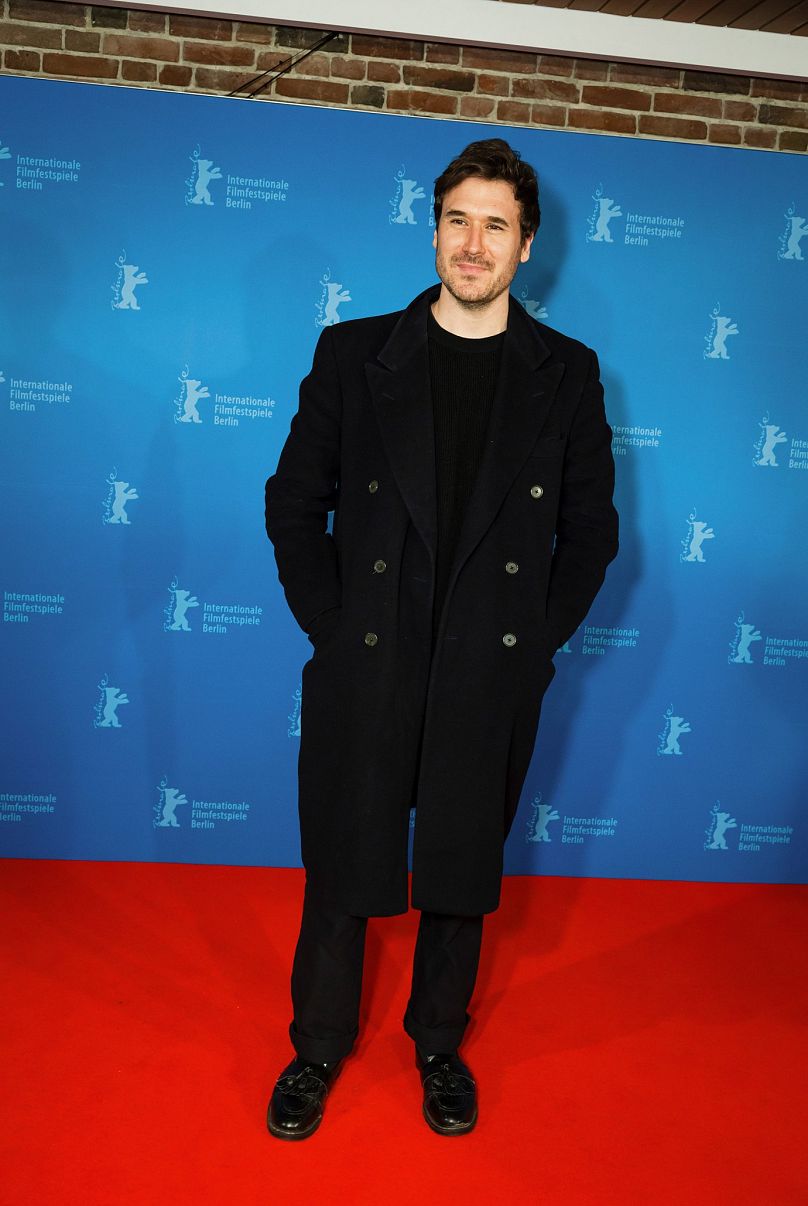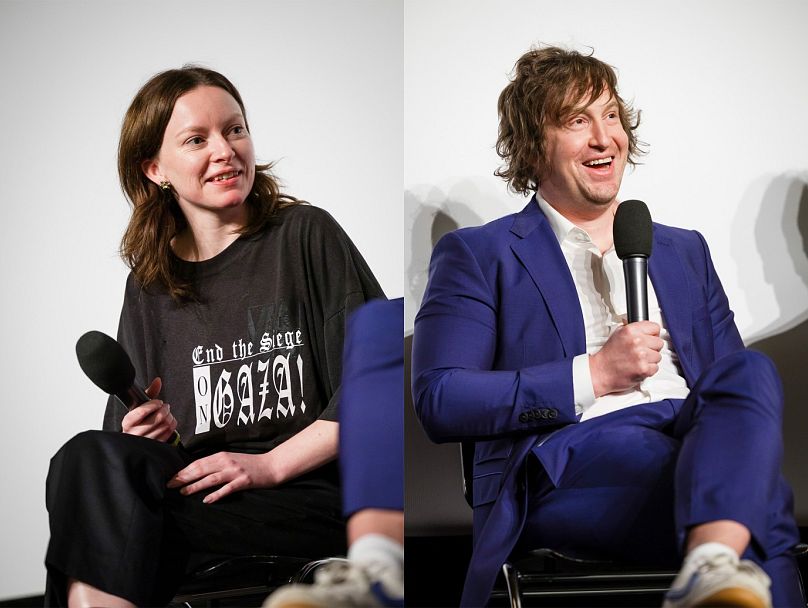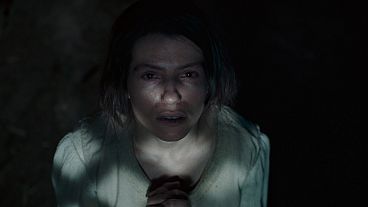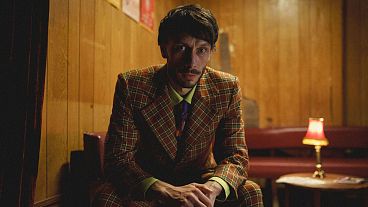Premiering at the Berlinale, 'Matt and Mara' has the foundations of a 'Will-they-won't-they?' romantic comedy but ends up as a far more knotty 'What-if-they-could?' study of unspoken bonds. Euronews Culture sits down with the director and lead actor to talk about the film.
Canadian director Kazik Radwanski specialises in interpersonal dynamics – specifically the ones that go unnamed.
Following his 2019 film Anne at 13,000 ft, which also premiered at the Berlinale, Radwanski reteams with Deragh Campbell (Never Eat Alone, Anne from Anne at 13,000 ft) and Matt Johnson (director of The Dirties and last year’s critically acclaimed BlackBerry) for Matt And Mara.
Premiering in this year’s Berlinale Encounters section – a rather fitting sidebar name, all things considered – it sees teacher Mara (Campbell) welcoming her students to poetry class. As she is about to head into the classroom, her old friend Matt (Johnson), a published author, surprises her by randomly crashing the lesson. No matter how intrusive this may seem, she can’t manage to conceal a smile.
They spend time together, reconnect, and end up taking a road trip to a conference Mara is attending. The tension between the two friends gradually becomes too close for comfort – and too close for a marriage, as Mara has a life with her husband Samir (Mounir Al-Shami) and their young daughter.
Sound familiar? It is on paper, but Radwanski likes to play with expectations. He avoids traditional storytelling arcs you’ve seen a dozen times in romantic comedies, and instead crafts a compelling study of how one deals with an unresolved past - and now present. And there are no easy answers – or attempts at clichéd sentiment - along the way.
Euronews Culture sits down with Kazik Radwanski and Matt Johnson to talk about Matt and Mara, what constitutes infidelity, and how what goes unsaid may hold more power than spoken words...
Euronews Culture: After seeing the film and recommending it to others, people have asked me to describe it. The best I could come up with was: It’s less a “Will-they-won’t-they?” romantic film and more a “What-if-they-could?”. How would you describe Matt And Mara?
Matt Johnson: Oh, that's a really brilliant way of describing it! If I had to describe the film, I would say that it’s about two people who loved one another as kids, finding each other as adults when one of them is married and with a kid. And she doesn't tell him that she's married with a kid. That’s what I say to people, even though that may or may not be accurate because we don't see that in the film - we don't know if she tells him or not, and Matt does seem to know at a certain point that they are married. But I like the way that you describe it – “What if they could?” Because it is a movie in some ways about potential.
Kazik Radwanski: Yes, potential. Or maybe what's going on between them is something they don't name or don't want to name. Or maybe that Mara wants to be able to exist and interact with Matt without context. “What if they could?” is good.
Matt Johnson: It’s a brilliant reframing of it, because the tension is not whether these characters actually love one another and do they want to get together because they clearly do. And it is the context that they put themselves in, through the separation, that has made that impossible - which is what makes this reframing so interesting. It’s also why Brief Encounter is such a perfect comp for the movie, because that’s another “What if they could?”, right? You watch that film and you think, “Oh god, these guys could be so happy together”, but of course they can't. It's not allowed.
The dialogue throughout the film feels natural and relatable. How much improvisation actually took place?
Kazik Radwanski: There was no formal dialogue or scripted dialogue. All the dialogue you hear is improvised and in one way or another.
Matt Johnson: But that's not to say that Kaz wouldn't come in between takes and say “I liked it when you took a conversation here.” We had private conversations - we would never talk openly, the three of us. He would talk to Deragh privately, he talked to me privately, and he would often zero in on things that I'd say and tell me: “Say that again.” So we would play the scene again and I would make sure to either get to that same line of dialogue, or find a new way to introduce this idea. It was directed improv.
Kazik Radwanski: There were anecdotes that Deragh would tell me, like the café scene or the dinner table scene about music. I hesitate to call them Deraghisms, but they’re types of observations that are sort of unique to her. She would tell me a story and I'll love it and then could see that connecting with the character, and then it grows into something else.
The chemistry between you, Matt, and Deragh is palpable and believable...
Matt Johnson: I gotta say that Deragh and I had that dynamic right away on Kaz’s last film (Anne at 13,000 ft)...
Kazik Radwanski: And what Deragh is amazing at is cutting down the scene, or cutting through it or not responding. I love moments when a character doesn't express himself. It feels very true to life – stopping, not answering or responding. People are present in different ways and that’s what I love about it. And I keep saying that I’d have a hard time directing Matt if it weren’t for Deragh! (Laughs)
Speaking of cutting or not responding, some of the most telling moments here are free of dialogue. The scene during which Mara continues jogging while her husband Samir stops tells you everything you need to know about their communication breakdown. How important was it to you to leave certain things unspoken? Because that, in a nutshell, is the film – the things that remain unspoken.
Kazik Radwanski: Absolutely. We shot many scenes, capturing beautiful little moments and getting these glimpses of a home life between Mara and her husband. And by removing the rest, it almost has more impact for me. It resonates maybe more and it allows the audience to piece things together by themselves. The husband is maybe a bit more present at home and she’s somewhere else, missing out on some of these moments with their child.
Matt Johnson: What I love about this example that you've brought up, the running scene – when I watched that scene, I thought to myself: “If that had happened between Matt and Mara and Mara had kept going, Matt would have just started laughing. It’s just a totally different frame when you view these scenes with her husband and think “What if this were Matt?” and how would that change things? Because she is the dominant one in that relationship with her husband, and he’s sweet and totally trusting of her. There's no gamesmanship between them, right? She's not being poked in the way that Matt pokes at her. Matt would be like, “What do you mean by that? You're lying, what’s this little game? What do you mean you don't like music? You just trying to seem cool and pretentious.” And because the audience gets to see two worlds - the domestic married life of this woman versus the more risky, private life with this paramour. And through that, we really get to see how she talks to different people.
You can’t help but take sides during the film, and I was finding myself oscillate between the two of them. He’s craving one thing without saying it. She craves his attention and seems to at times feel belittled by him. How tricky was it to find a balance and keep people hopefully on side with both protagonists?
Kazik Radwanski: It’s funny, because it feels like it's a film with conflict, and disagreement. Key to that was also something that was on my mind – I didn’t want the husband, the stay-at-home dad, to be a bad guy or for there to be petty disputes between them. I want every character to be extremely understandable, and I deeply empathize with all the characters. It’s Mara's film and I love the feeling of losing sight of that at times. And she is very cutting in the car, when Matt says that he loves her and she tells him “You don't get to say that word.”
There’s a certain universality to the film even if it feels very specific to Matt and Mara’s relationship. Everyone has had friendships that exist in a bubble where the rules aren't completely defined, or bonds that don’t need labels because no label could fully do it justice. But there is an undercurrent in the film that seems to suggest that a friendship between a man and a woman is never free of a certain ambiguity.
Matt Johnson: Can men and women ever be friends without something else? The big question!
Kazik Radwanski: That was an initial question for the film. At what point is it crossing the line? I didn’t want the film to be about overtly crossing the threshold...
Matt Johnson: Do you want to know what I think the most “Oh my god, she's bad” moment of the whole film?
Kazik Radwanski: Yeah!
Matt Johnson: When she gets back in bed after being on the phone with me, and turns to her husband and says, “Have I told you about my friend Matt?” And he replies “No”. And that for me was really bad behaviour. Because to me, the definition of an affair is literally anything you do that you would not tell your partner about. I have a very low stakes definition of it, where as soon as you're doing anything that you wouldn't proudly admit to. It’s like Nietzsche’s eternal return. I think the bar is quite low - anything you wouldn't let your partner know about, you're in dangerous water.
Kazik Radwanski: And I relate to Samir in a lot of ways. He’s trusting, and maybe a part of him doesn’t want to know. I think about that too in relationships – some people want to know about the exes, and some just don't care.
Matt Johnson: But Samir, the husband, is not operating with perfect information. If he knew what was going on, he'd be like “What the fuck is going on?”
Kazik Radwanski: Perhaps. I don't know. I think there is there is going too far in that direction, too. It's not just the perfectly noble non-jealous boyfriend.
Matt Johnson: Maybe a casual lack of concern that is almost a defence mechanism.
Kazik Radwanski: Yeah, maybe. A different way of compartmentalizing it...
Without spoiling too much, I love the ending because it feels resolved yet unresolved at the same time. I found it hopeful, but also quite sad because it emphasises many of the compromises some do and some don’t, as well as the sacrifices a person can make for a domestic life.
Kazik Radwanski: I always liked just seeing their names on a crinkled up, disposable little receipt at the end. It’s this fleeting, small thing, but something that she's going to keep. Even the title of the film is something that we sort of discovered through the filming of it. It's such a generic title, but it means something now.
There’s a phrase that Matt says in the film at one point when you're talking to the students about publishing and literature, about “avoiding satisfaction” and the fact that they shouldn't worry too much about the audience. Would you say the same thing applies to filmmaking?
Matt Johnson: Definitely. I’ve come to believe that deeper and deeper every single year, and I actually think that the main error that a lot of young filmmakers make – and career filmmakers as well - is make something thinking about your audience. Only because my belief is that we're so bad at predicting what other people think, but we're so good at knowing ourselves.
The recipe that I'm always telling film students to specifically make a first feature is to make the film that you desperately wish you could see that nobody else is making. And I think you will be surprised by how many people cleave to that. Because while we're all completely and totally different, we're much more similar than we are different. And so, rather than trying to predict what an audience is going to want or, to sublimate that, rather than to predict what a friend is going to want you to say or imagine what a partner wants from you, it's so much better to just think about it from the point of view of “What do I want to say? What do I want to see? What excites me?” And the idiosyncrasy of it will wind up being universal.
So while it is a privately held opinion, I definitely do work by that code, and I think it helps a lot. All my favourite writers and filmmakers ascribe to that. I think that all the best stuff comes from the extremely idiosyncratic and the extremely personal.
